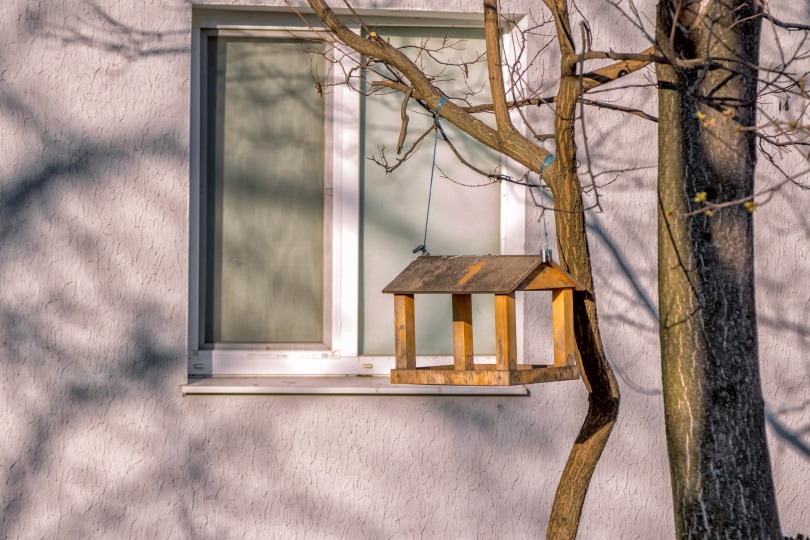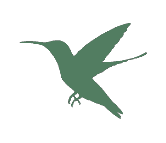Should You Take Down Your Bird Feeder in the Summer?
Last Updated on

Even though insects should be in plentiful supply, it is generally acceptable to leave feeders up during the summer months. The feeder will continue to attract birds looking for supplemental food, which means you can enjoy seeing seasonal birds in your garden throughout the year. However, you do need to take extra care during hot months by putting out less seed, cleaning more often, and avoiding filling feeders at all if your area is home to hungry bears.
Read on for more information on feeding birds in the summer and what additional steps you should take to ensure the safety of your feathered visitors.

Don’t Feed the Bears
While it might seem unlikely that a handful of sunflower seeds will attract a bear, hungry bears are attracted to just about any food. They will be especially attracted to food like suet, but they will approach a feeder filled with nuts and seeds, too. If there are bears in your area, you should remove feeders and clear them up in plenty of time. Many states offer advice on suitable dates to do exactly that.
Stop the Suet
Suet is essentially animal fat, and animal fat goes bad quickly if it is left in the heat. This is especially true for homemade suet blocks. Even if commercial suet products say they are safe at temperatures above 100°F, they can still spoil. Once the warm months start hitting, either make sure that you check suet blocks every day or so and remove any that are going bad or replace them with more appropriate treats that are less likely to spoil.

Don’t Overfill Feeders
Even seeds and nuts can spoil in the summer heat. If you overfill a feeder, the seeds will have a higher chance of going bad, so you will have to throw them away or risk making the birds in your garden ill. If you’re lucky, they will ignore the bad seeds and choose to feed somewhere else. Instead, fill the feeders halfway. There really should be plenty of insects around, so you only need to be providing a supplemental source of treats.
Clean Up Regularly
It isn’t just insects that are out in abundance in summer, and it isn’t just birds that are happy to take advantage of your seed generosity. Other animals like raccoons will gladly come and eat the seeds left on the ground. During summer, those seeds will go bad quickly, so local wildlife and ground-feeding birds may eat the bad seeds and get sick. Ensure you clear up every day or two to get rid of any potential toxins.
Wash Feeders
You should be washing bird feeders at least twice a week during summer. You can wash them where they are with a few drops of bleach, but every couple of weeks you will need to bring them inside, take them apart, and give them a thorough wash with soapy water to ensure that you remove all remnants of seeds and bacteria.
Relocate Your Feeder
If the feeder sits in the sun and gets too hot, some of your winged visitors may simply refuse to visit. Consider moving the feeder to a shaded area. The birds will continue to eat, and they will be grateful for being able to do so in a shaded area that offers a little respite from the beating summer rays.

Summer Treats
Suet is an ideal food for winter. It is high in fat, and it helps birds maintain body warmth. Not only does it have a greater chance of going bad in the summer months, but the birds don’t need food that is so high in fat during summer. Change to a decent, all-purpose seed like sunflowers or safflowers, or choose something that is specific to the birds that gather in your garden.
In Conclusion
There is no reason to stop feeding birds in summer, although some people choose to stop because there is an abundance of insects for birds to feed on at this time of year. Most birds simply don’t need the help, but that doesn’t mean they don’t appreciate a little supplemental snack.
Take steps to ensure seed isn’t going bad by regularly filling and cleaning feeders and removing treats like suet while the temperatures are at their hottest. The only time you really do need to stop feeding birds in the summer is if you live in an area with bears.
- Related Read: 8 Proven Ways to Keep Squirrels Out of Bird Feeders
Featured Image Credit: Elena Kirey, Shutterstock
About the Author Robert Sparks
Robert’s obsession with all things optical started early in life, when his optician father would bring home prototypes for Robert to play with. Nowadays, Robert is dedicated to helping others find the right optics for their needs. His hobbies include astronomy, astrophysics, and model building. Originally from Newark, NJ, he resides in Santa Fe, New Mexico, where the nighttime skies are filled with glittering stars.
Related Articles:
10 Types of Hummingbirds in Arkansas (With Pictures)
8 Types of Hummingbirds in Nebraska (With Pictures)
5 Types of Hummingbirds in Idaho (With Pictures)
3 Types of Hummingbirds in Mississippi (With Pictures)
8 Types of Hummingbirds in Kansas (With Pictures)
5 Types of Hummingbirds in West Virginia (With Pictures)
5 Types of Hummingbirds in Ohio (With Pictures)
Where Do Nuthatches Nest? Nuthatch Nesting Habits Explained
